This week’s Monday Roundup is sponsored by Nutcase Helmets.
Here are the best stories we came across last week…
More Humvees ahead: Oregon Senate Bill 645 would clear a path for 2-ton, military-grade Humvees to be driven on the road.
The potholes are insane right now: An anarchist group in Portland is not having it.
See you in court: California says they won’t roll-back auto emissions standards, despite what the Trump administration says. One state down, 49 to go.
Fire department vetoes: We’ve known for years that the fire bureau is an all-powerful lobby when it comes to torpedoing bike access projects; now Human Streets SF has reported new depth on the issue based on emails between fire officials and San Francisco’s transportation authority.
DOT guidelines lagging. Still: It’s 2017, traffic crashes are on the rise, and the bulk of state transportation engineers still abide by outdated facility and design manuals.
Biking Niagara Falls: Major national parks managers have figured out that people don’t just want to drive, park, and take a selfie. They want bike paths!
History buffs, click here: Sit back and enjoy this photo gallery of this French museum exhibit that chronicles 200 years of bicycle history.
Not just for tourists: A new report of New York City’s bike share usage shows the system is being used primarily by commuters for the short trips to other transit stations.
Advertisement
New bike share player: Bay Area-based LimeBike, a bike share system without centralized hubs and that costs just $1 per ride, just raised $12 million in venture funding.
Biking comes full circle in Beijing: Once king of the roads, biking faded as China’s economy boomed. Now bikes are coming back again, thanks in large part to hi-tech bike share systems.
Electric trucks are still trucks: The auto industry is excited about new urban delivery trucks that have electric engines and are much smaller than normal trucks. These would be an improvement, but we still prefer pedal-powered trikes.
Speed limiters on trucks: NHTSA, the nation’s transportation safety agency, wants lower truck speeds. Motoring advocates think that’s a bad idea.
London is bonkers: In a good way.
Drug user blows his own whistle: A professional road racer comes clean by sharing his drug use with the BBC in an insightful and fascinating story.
How cities perpetuate parking fights: Brooklyn Spoke breaks down something that has annoyed me for years: When city transportation departments focus way too much on “parking impacts” when proposing street upgrades.
— Jonathan Maus: (503) 706-8804, @jonathan_maus on Twitter and jonathan@bikeportland.org
BikePortland is supported by the community (that means you!). Please become a subscriber or make a donation today.



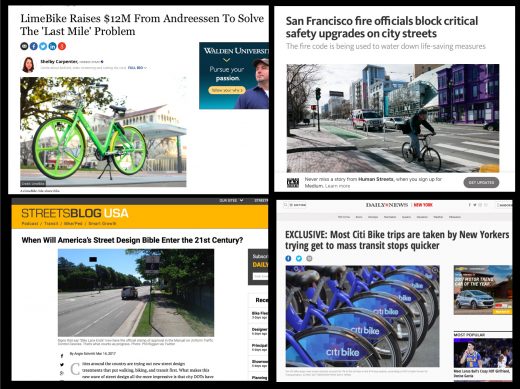
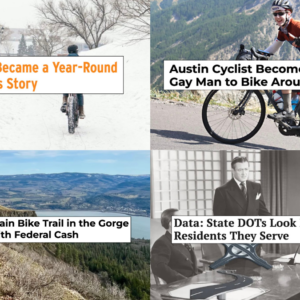
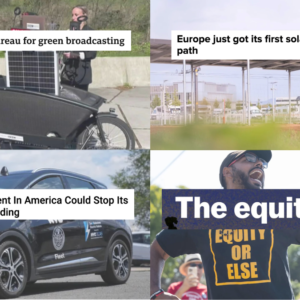
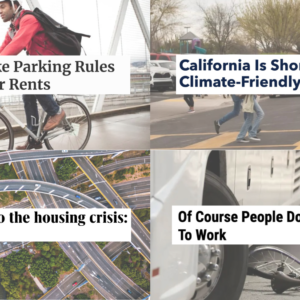
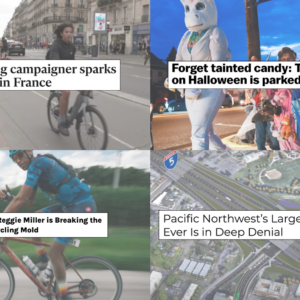
Thanks for reading.
BikePortland has served this community with independent community journalism since 2005. We rely on subscriptions from readers like you to survive. Your financial support is vital in keeping this valuable resource alive and well.
Please subscribe today to strengthen and expand our work.
Any SUV on the street weighs more than 2 tons. My civic weighs 2500 pounds – that’s 1.25 tons for you folks from Rio Linda.
A Ford Excursion can weigh about 4 tons:
https://en.wikipedia.org/wiki/Ford_Excursion
Surplus Humvees are already allowed on Oregon roads – I’ve seen them, but it’s been a while.
In Portland this would be ~$18 million dollars each year (based on the 2015/2016 budget). Of course, TfL is not chronically underfunded like PBOT.
should not have been nested.
According to the article, it’s an issue with meeting emissions and safety requirements, preventing registration such that they can’t legally be driven on roads. The fact that they weigh closer to 3 tons is, indeed, beside the point.
H1’s Hummers have been sold to the public since 92 I assume they been legal since then. They are 86.5 inches wide and My 4×4 F150 Ford short box standard cab is 79” inches wide and weighs 4400 pounds.
Every vehicle has it’s purpose. I tow my jet sled and I use some primitive boat launches (ever been fishing on the Olympic Peninsula?). I need a big power vehicle to not get stuck. What I don’t need is the permission of the folks on this website that don’t understand the first thing about what I require. If you don’t like what I drive fine. Don’t like it all you wish.
There’s no replacement for displacement but I like a big straight 6 over V8 engines.
I have other rigs for lighter work, but the gas mpg is pretty far down the list of my requirements for my truck. I drove it down to Portland for the Worst Day ride, it didn’t seem inordinately large.
Sounds like some pretty dang sweet rigs, Doug.
“I need a big power vehicle to not get stuck.”
If enough people start holding that view we’ll soon all be stuck .
“What I don’t need is the permission of the folks on this website that don’t understand the first thing about what I require.”
That view of freedom, that no one can tell me what I can do, how much of the finite resources I can burn in my V8, is awfully familiar but it is also obsolete. In a full world* that is blowing past limits faster than we can keep track, wanton behavior that threatens the future habitability of our planet is everyone’s business.
*TM Herman Daly
as long as his behavior is priced accordingly, why should there be an issue?
no different than congestion pricing.
The problem is that it’s not. We’re all paying for it.
I can think of plenty of issues. If pricing is our only tool (and we’re so far from full accounting for the direct costs and externalities that is isn’t even funny) then how to you account for the differences in ability to pay? In many European countries a speeding ticket is assessed as a function of income because they recognize that rich people could (in our system) easily flout the laws and just pay the (standard) fines.
Really? That is a fabulous idea! Also, thanks for using the word ‘flout.’
Yes.
https://en.wikipedia.org/wiki/Day-fine
If you are wealthy enough and drive waaaay over the speed limit and they catch you you may owe in the millions (of the local currency).
“…I drove it down to Portland for the Worst Day ride, it didn’t seem inordinately large.” doug
Down to Portland from where? Seattle, or similar distance? High gas mileage is something that big heavy rigs used to be notoriously bad about…10-12mpg…but could be they’re getting better…17-18mpg ? Though I’m not sure, not really keeping up on what big pickups, or humvees get for mileage.
Think I may have read a very short item in the last couple weeks, that the sitting pres’s admin would like to roll back future high mpg objectives set for auto manufacturers. Seems not a good idea, to me. You got the money, get whatever rig you want, so you can do the things you want to do. Any environmental downside to having and using big rigs, is proportionately scaled down according to level of operation. Occasional short trips to recreational spots, would be small energy consumption in comparison to regular commutes back and forth between Portland and Seattle.
“the gas mpg is pretty far down the list of my requirements for my truck”
And that’s what might change if we actually paid the real cost of fuel including external costs, which is not the $4 that it hit for a while when demand surged ahead of production, but probably somewhat more than that. Likely at least $5/gallon, maybe more.
And if it did cost that, you can bet the automakers would bend over backward to bring you more fuel-efficient trucks that still meet your requirements. Ford already made pretty good strides improving the F-150’s economy after the last fuel crunch, but much more is possible.
You can also bet that many people would decide a full-sized 4×4 pickup isn’t needed to meet their requirements. I know an awful lot of people who own full-sized pickups even though a compact model could do everything they need, especially if better choices in compacts were available. I also know an awful lot of people who own pickups so they can haul drywall or lumber or dirt or yard waste once or twice a year – but at $6 they might decide they can run some of those loads with a wagon or CUV, and rent a truck once in a while for the big loads, as I do. (Side note: Zipcar has nice compact pickups that are super easy to rent for most hauling — except they only have the base models, whose payload capability is no more than a Subaru. When I need to haul a heavy load like dirt I go to Uhaul: their $20/day F-150s seem to handle a half yard of dirt much better, even though their payload rating on paper isn’t much higher).
You might still decide to own a full-sized 4×4 – and it would be your right to do that if you’re willing to pay for the fuel. The F-150 isn’t going anywhere. But under that scenario I’m betting it won’t be the #1 selling vehicle in America anymore.
Interesting, Doug.
Seattle Municipal Code Sec. 11.72.070 – Prohibits the parking of a vehicle more than 80 in. wide between the hours of 12:00—6:00 a.m., except in an industrial zone.
So if you ever come into town after your Olympic Peninsula adventures, be mindful that the smarmy condescending attitude about the preferences of others can cut both ways.
True, Excursions can weigh 4 tons, but they are rare. Far more common in Oregon are the heavy-duty pickups favored by people in the construction trades, and those typically weigh 3.5 to 4.5 tons. Since they’re not subject to fuel economy testing, CAFE and other passenger-vehicle regulations like light-duty pickups such as the F-150, most people have no idea how much more these vehicles weigh.
So that explains the Humvee I saw in Portland with Pacific Wonderland plates.
Big difference between an HMMWV, the military version, and the civilian versions (H1, H2 and H3 Hummers) . Plenty of hummers on the road but very few are HMMWV surplus military vehicles. Even the H1 the civilianized military version sold less than 12k units during its 15 year production run.
Teddy knows the difference. This was a Jungle Camo Humvee aka HMMWV.
Jungle camo does not a HMMWV make. Plenty of regular old Chevy’s Ford’s and Toyota’s done up in camo. Paint does not make it govt surplus
Sorry…I don’t think the suggestions of the writer in this story, are too good: https://brooklynspoke.com/2017/03/16/dont-think-of-a-parking-space/
…basically, he suggests not mentioning to stakeholders; neighbors, business owners, etc, about proposed street projects seeking to provide better biking conditions…that ‘x’ modest amounts of street parking for motor vehicles will be lost.
Idea hopefully being that people concerned for the need for such parking, won’t notice that in the plans, it’s being lost, and will be too anxious about the lack of mention, to bring the loss up to other concerned parties, officials and so on. So in other words, maybe they’ll just keep silent and let pass, what may to them seem to be a sneak attack on their neighborhood’s livability and business viability.
The writer’s suggestion seems like a very poor strategy for building confidence in projects seeking to improve conditions for travel by means other than motor vehicles. It’s additionally unfortunate that the writer doesn’t keep in check, his apparent animosity towards people concerned about motor vehicle parking availability; he dishes out a few of the standard animosity laden terms to dismissively refer to these people. There’s enough of that kind of thing going around already…people don’t need any more of it.
What I think people do need, are more suggestions as to ways that projects offering improvements to biking and walking will more than make up for the loss of livability and business associated with availability of parking for motor vehicles on the street.
Hi! Thanks for your comment on this. I’m a big fan of BikePortland and everything Jonathan does. I’m a lurker here from time to time, especially on the very valuable Monday Roundup.
Just as a quick response, I don’t think such information about parking loss should be withheld from people or not mentioned at all. Quite the contrary. Here’s what I wrote:
“If possible, don’t give prominent placement to NIMBY concerns in your presentations. Just don’t. Will there be an impact on parking? Maybe, but don’t put such information on the same list as a project’s positive benefits, such as injury and fatality reduction rates. That’s not to say that you shouldn’t be prepared to answer the inevitable question about how much parking will be lost to a bike lane, bike share station, or other street transformation. But having such information available at one’s fingertips is vastly different from giving it a spotlight in a PowerPoint presentation.”
It’s not that you don’t mention it. It’s that you don’t put it on equal footing with a project’s benefits, such as how many lives it will save.
Listening to people who are worried about losing parking is REALLY important and there are legitimate reasons why people might need curb access right in front of their home or business. People are owed the respect of being listened to because they’re people. Like I said:
“I want to be clear: the strategy isn’t to treat people like idiots or ignore and deceive them. We’re all neighbors, after all.”
The larger point is this: When you place parking loss concerns front and center — or even preemptively address this before a presentation, as I’ve seen — it opens the door for parking to be THE thing that torpedoes a very worthy project, even in neighborhoods where the majority of people don’t use or own cars. I’ve seen that happen way too many times in New York.
This is just one way of dialing down the importance cities put on parking.
“…It’s not that you don’t mention it. It’s that you don’t put it on equal footing with a project’s benefits, such as how many lives it will save. …” doug g
You’re seeming to suggest people would put motor vehicle curbside parking above saving lives. Not a very good rationale, because people will respond back, that travel in their motor vehicle, and the possibility of being able to find parking at the curb on the same block or near to their destination, is safer than trying to ride a bike on the street, whether or not it has a bike lane.
Bike advocates don’t do a very good job of selling projects providing safe, comfortable to use, and convenient to destination bike infrastructure. Doesn’t seem to be many instances where neighborhood business owners are saying ‘Our businesses are suffering, because our customers traveling here by bike, can’t get parking on the street because all of the parking there is taken up by parked cars.’.
Creating and proving the validity of a business model for a neighborhood business district, where the 80 percent of road users, and customers, are traveling by bike, and coming by bike to do business in the neighborhood, would likely be a sure fire project sell. Lower the bar to a more attainable percentage: say 50 percent. I’d like to see that happen, somewhere in Portland, or out where I live in Beaverton.
It’s good to read about London’s continuing efforts to enable biking to be an increasingly safer, more practical and enjoyable means of travel in the city. Serious, serious problems in that city apparently, with motor vehicle related traffic congestion.
Disappointing to read that despite references to “…major cycle superhighways…”, with corresponding numbers, ex; “cycle superhighway 9”, the city doesn’t apparently yet have much mileage of bike routes that actually are distanced, or as the article says, “segregated”, from roads used with motor vehicles.
“…Today’s press release contains no commitment to actually build any segregated cycle route beyond the one scheme (the north-south extension) already announced. This includes only half a mile of segregated track. With the cancellation of the 4.5-mile segregated scheme on the Westway and A40, the net total of new segregated routes so far promised by this mayoralty is minus four miles. …” guardian
I am actually just fine with people using HMMWVs in limited scenarios as described in the article. I don’t want to have them used as daily drivers,but I don’t really care if they can be used in parades etc. It’s no worse than a Rose Festival float and might even get better gas mileage.
Re the SF fire dept and the street redesign–doesn’t it make more sense to design the firefighting equipment to fit the built environment, rather than the other way around?
Thats the way they do it in places like Japan or Germany.
Regarding the proposal to put governors on big rigs: Having driven for a trucking company that governed most of our rigs at 58 mph (a handful were set to 63 mph and a couple were ungoverned), I think it is a fabulous idea. Sure, a few morons are going to pass a slightly slower rig from time to time and create a small back-up, but that can be dealt with in a variety of ways.
That company I worked for set our rigs so slow (yes, it was still above the speed limit, but it’s not like we live in a culture that respects those limits) because they had found that the lower speed prevented crashes. Safety was a big deal for the owner, a former truck driver himself; he had a safety spy who would hide out with binoculars to make sure we did everything by the book. Failure to comply meant unemployment.
“the gas mpg is pretty far down the list of my requirements for my truck”
And that’s what might change if we actually paid the real cost of fuel including external costs, which is not the $4 that it hit for a while when demand surged ahead of production, but probably somewhat more than that. Likely at least $5/gallon, maybe more.
And if it did cost that, you can bet the automakers would bend over backward to bring you more fuel-efficient trucks that still meet your requirements. Ford already made pretty good strides improving the F-150’s economy after the last fuel crunch, but much more is possible.
You can also bet that many people would decide a full-sized 4×4 pickup isn’t needed to meet their requirements. I know an awful lot of people who own full-sized pickups even though a compact model could do everything they need, especially if better choices in compacts were available. I also know an awful lot of people who own pickups so they can haul drywall or lumber or dirt or yard waste once or twice a year – but at $6 they might decide they can run some of those loads with a wagon or CUV, and rent a truck once in a while for the big loads, as I do. (Side note: Zipcar has nice compact pickups that are super easy to rent for most hauling — except they only have the base models, whose payload capability is no more than a Subaru. When I need to haul a heavy load like dirt I go to Uhaul: their $20/day F-150s seem to handle a half yard of dirt much better, even though their payload rating on paper isn’t much higher).
You might still decide to own a full-sized 4×4 – and it would be your right to do that if you’re willing to pay for the fuel. The F-150 isn’t going anywhere. But under that scenario I’m betting it won’t be the #1 selling vehicle in America anymore.
The article on Humvees was obviously written by someone who had no concept of what they were or what they were all about. First off, it’s not “gas mileage”..it’s fuel mileage. They take diesel. They use the same exact motor used in every GM diesel vehicle up to about 1999. It’s the 6.2L/6.5L turbo motor that does better than 4mpg. If it did 4mpg, that means every GI would have to haul a trailer just to hold the fuel.
By the way, the 6.5L is very agreeable to pretty much any fuel (but gas) like grease…or bio diesel.
It is wider than an average truck and quite safe. Safer than those electric golf cars people drive around.
But, they suck and have no A/C. So don’t expect everyone to go out and buy them. And please, don’t go off on a rant about how skeeery the world would be with some old military scrap on the road.
“Safer than those electric golf cars people drive around.”
Gee, that’s not at all condescending. By “electric golf cars” do you mean those NEVs like the ZENN and Zap Xebra (which you hardly ever see), or do you mean cars like the 3500 pound Nissan Leaf?
Ok, a Humvee might be safer in some situations for its occupants than a Leaf. Maybe. Certainly not safer for the people around it. I’ve always found it a bit sociopathic how people will talk about getting a heavier vehicle because it’s safer for them (or, worse, their teenager driver), while ignoring the potential impact to others’ safety.
But is it even safer for its occupants? Safety isn’t just about mass. You’re talking about a vehicle that doesn’t have to meet passenger-car safety standards, is far more likely to roll over than a car, and doesn’t provide the roof-strength, crumple zones, airbags or other crashworthiness attributes of a car. Maybe in a collision with a Smart Car, which will be forced to absorb most of the impact of a collision with just about anything, the Humvee will come out ahead of a Leaf. But what if you get hit by an 80,000 pound big rig or MAX train? Up against something that big, your own vehicle’s mass becomes nearly irrelevant and you’re forced to rely on crashworthiness: the Leaf will only be forced to absorb 5% more of the force of that collision than a Humvee will. With the Leaf, you would walk away from a collision that would kill you in the Humvee.
1)I was referring to the electric golf carts that are masquerading as cars. Yes. You made up the leaf.
2)”More likely to roll over” (referring to the Humvee)..more likely than one? A semi truck? A Ford Explorer…..or any other SUV?
You are fixating on a military surplus vehicle that is no longer made. Parts are not easy to find and few people really know how to work on one. They will die off over time and only the die hard will own them over the long term. Wasting time on fighting it is a waste of time and energy and only makes the fighter look dumb. All the while proclaiming biking and driving e-golf carts the wave of the future and oh so safe.
The reality is, anything larger than a sedan is a death missile on so many levels. Adding or not adding a Humvee is irrelevant. I ride a lot and drive a lot. Humvees are cool and for bike portland to flip out about it…is just dumb.
I think hating on electric delivery trucks is the wrong tack.
Diesel pollution is a huge problem in the city, and if we can convert some of the fleet over to electric that could do a lot of good for the region:
http://projects.oregonlive.com/pollution/
In most parts of the city the air index for vehicular pollution is 50x or higher. And diesel trucks are one of the top contributors to the pollution problems. A conversion of the fleet would be fantastic for lung health.
Sure a delivery bike would be better; but this is definitely the wrong fight for good being the enemy of great.
“A conversion of the fleet would be fantastic for lung health.”
Whose lungs?
And what fuels power the electricity you’re imagining is fed into these vehicles? Still a lot of coal these days, and natural gas is hardly better.
This argument?
Electric power generation and transmission is WAY more efficient than an engine found in a vehicle. Even all things taken into account most studies show that even in areas that are coal-only that electric vehicles are no worse and often better than IC engines. And that picture gets rosier and rosier when you come out west and have a big chunk of your power produced from electric, hydro, nuclear, and natural gas like we use for the majority of our power in Portland.
Looking at Delivery Trucks and their extremely low mileage due to stop and go nature of the vehicles and the picture gets even rosier.
So who’s lungs are helped?
Everybody’s. Everybody’s lungs are helped by conversion to electric vehicles; particularly when looking at conversion of high polluting delivery trucks.
Also, many (probably most) EVs are charged by end users who’ve opted for renewable power. At least with PGE, it’s not that much more expensive to avoid Boardman coal power.
“most studies show that even in areas that are coal-only that electric vehicles are no worse and often better than IC engines.”
Can you please show me the studies you are referring to?
“Everybody’s lungs are helped by conversion to electric vehicles”
I beg to differ.
If we were to switch to electric delivery vehicles this translated to additional electrical generation somewhere. To the extent that that extra generation is coming from fossil fuels, someone’s lungs downwind of the facility are worse off. Just because we here are not downwind (and of course we’re all downwind when it comes to the climate change implications of electricity generation) doesn’t mean there are no health costs to what you are proposing.
http://www.opb.org/news/widget/the-diesel-you-breathe/
Diesel Pollution in Central Portland is worse than it is in 90% of the country. But sure, let’s keep the diesels going instead of encouraging the trucking fleet to switch to electric.
Who decreed that those were the only two options?
I’m no fan of diesels, but I’m also no fan of hyped alternatives which, upon closer inspection, always(?) turn out to have their own issues.
“Everybody’s lungs are helped by conversion to electric vehicles”
Just came across a study that looks into some aspects of this (social costs of electricity generation).
Table 7 of this paper compares lifecycle air pollution costs* of different electricity generation technologies: http://www.mdpi.com/1996-1073/10/3/356/htm
Offshore wind, solar PV, and lignite come in at .07, .60, and .94 respectively. Seemed interesting to me.
* The table does not include estimates of damage due to climate change or negative effects on biodiversity (including land use), as these effects are discussed in separate sections of this article.